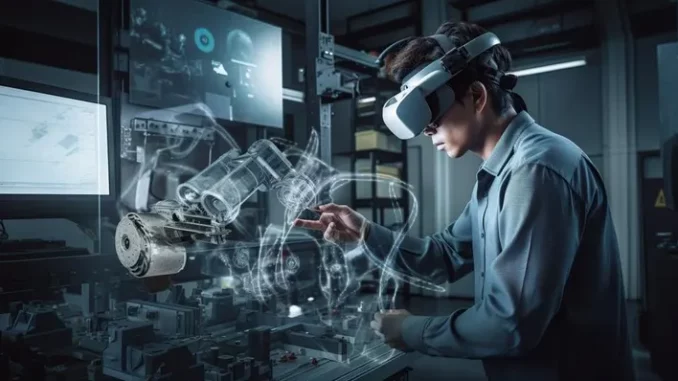
The manufacturing industry has undergone significant transformations over the years, with advancements in technology playing a pivotal role. One of the most revolutionary technologies that has gained traction in recent times is Artificial Intelligence (AI). With its ability to automate processes, analyze vast amounts of data, and make intelligent decisions, AI is reshaping the future of manufacturing.
In this blog post, we will explore the growing role of AI in the manufacturing industry and delve into its opportunities and challenges. We will also provide insights from industry experts on how manufacturers can implement AI effectively. Furthermore, we will discuss capital allowances and utilization for manufacturers embracing AI technology. We will take a glimpse into the future outlook of AI in manufacturing and its impact on various aspects of the industry.
So buckle up as we embark on an exciting journey into the world where automation meets intelligence – The Future of Manufacturing: Automation and AI!
Opportunities for Manufacturers through AI
The integration of AI in the manufacturing industry opens up a world of opportunities for manufacturers. One key opportunity lies in optimizing production processes and reducing costs. By leveraging AI-powered analytics, manufacturers can analyze vast amounts of data to identify patterns and inefficiencies within their operations. This enables them to make informed decisions that enhance productivity and minimize wastage.
AI also plays a crucial role in predictive maintenance. Traditional maintenance practices often rely on fixed schedules or reactive repairs, leading to downtime and higher costs. With AI-driven predictive maintenance, manufacturers can leverage machine learning algorithms to analyze real-time data from sensors embedded in equipment. This allows them to accurately predict when machinery is likely to fail, enabling proactive maintenance interventions before breakdowns occur.
Another significant opportunity offered by AI is the enhancement of product quality assurance. Through computer vision systems powered by AI algorithms, manufacturers can automate visual inspections on the assembly line, detecting defects with greater accuracy than human operators alone. This reduces errors, improves efficiency, and ensures that only products meeting high-quality standards are delivered to customers.
Furthermore, AI presents an avenue for improving supply chain management through demand forecasting capabilities. By analyzing historical sales data along with external factors such as market trends and economic indicators, manufacturers can anticipate future demand more accurately. This enables them to optimize inventory levels and reduce stockouts or excess inventory.
Embracing AI technologies provides numerous advantages for manufacturers – from streamlining operations and optimizing resource allocation to improving product quality control and enhancing customer satisfaction.
Risks and Challenges of AI in Manufacturing
Implementing artificial intelligence (AI) in the manufacturing industry brings forth numerous benefits, but it also presents its fair share of risks and challenges. One significant risk is the potential for job displacement. As AI technology advances, there is a concern that machines will replace human workers, leading to unemployment and economic instability.
Another challenge is the complexity of integrating AI systems into existing manufacturing processes. Companies may face difficulties in aligning their operations with new technologies, requiring substantial time and resources for implementation. Additionally, maintenance and cybersecurity pose ongoing challenges as companies must ensure that AI systems are properly maintained and protected from cyber threats.
Moreover, data privacy issues arise when utilizing AI in manufacturing. As these systems collect vast amounts of data to make informed decisions, concerns about data security emerge. Manufacturers must prioritize safeguarding sensitive information to maintain customer trust.
Ethical considerations also come into play when using AI in manufacturing. Questions surrounding accountability arise if an autonomous system makes a critical error or causes harm to humans or the environment.
Furthermore, regulatory compliance poses another challenge for manufacturers implementing AI technology. Regulations regarding safety standards, worker protection laws, and ethical guidelines differ across regions; thus ensuring adherence requires careful navigation through complex legal frameworks.
Addressing these risks and challenges requires thoughtful planning and proactive measures from manufacturers seeking to leverage the power of AI while mitigating potential downsides.
One way to address the risk of job displacement is by reskilling and upskilling workers to adapt to new roles created by AI technologies. Companies can also consider implementing a more gradual transition to AI, allowing employees to work alongside machines and learn how to operate and maintain them.
To overcome complexity in integration, companies should carefully assess their current processes and identify areas where AI can add value. They should also invest in proper training for employees who will be working with AI systems and establish clear communication channels between departments.
Implementing robust data privacy measures such as encryption, access controls, and regular security audits can help mitigate data security risks. Manufacturers must also comply with relevant data privacy regulations, such as the General Data Protection Regulation (GDPR) in Europe or the California Consumer Privacy Act (CCPA).
To address ethical concerns, manufacturers must prioritize transparency and accountability when deploying AI systems. This includes regularly auditing algorithms for bias and ensuring that they align with ethical standards set by regulatory bodies.
Lastly, companies must stay informed about evolving regulations related to AI in manufacturing and proactively update their processes and systems accordingly. Involving legal experts in the planning stages can help manufacturers navigate complex regulatory landscapes effectively.
In conclusion, while there are risks and challenges associated with implementing AI in manufacturing, they can be mitigated with careful planning, investment in resources and training, and a commitment to ethical and responsible use of the technology. Manufacturers who successfully navigate these challenges can reap the numerous benefits that AI offers, including increased efficiency, improved decision-making, and enhanced competitiveness in the market.